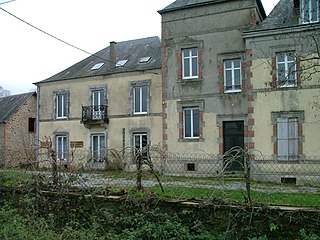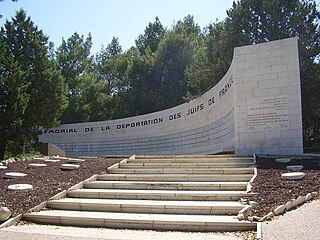 W
WThe Holocaust in France was the persecution, deportation, and annihilation of Jews and Roma between 1940 and 1944 in occupied France, metropolitan Vichy France, and in Vichy-controlled French North Africa, during the World War II. The persecution began in 1940, and culminated in deportations of Jews from France to Nazi concentration camps in Nazi Germany and Nazi-occupied Poland. The deportation started in 1942 and lasted until July 1944. Of the 340,000 Jews living in metropolitan/continental France in 1940, more than 75,000 were deported to death camps, where about 72,500 were killed. The government of Vichy France and the French police participated in the roundup of Jews. Although most deported Jews died, the survival rate of the Jewish population in France was up to 75%, which is one of the highest survival rates in Europe.
 W
WAu revoir les enfants is an autobiographical 1987 film written, produced and directed by Louis Malle. The film won the Golden Lion at the Venice Film Festival.
 W
WLe Chambon-sur-Lignon is a commune in the Haute-Loire department in south-central France.
 W
WChâteau de Chabannes was an orphanage in the village of Chabannes in Vichy France where about 400 Jewish refugee children were saved from the Holocaust by efforts of its director, Félix Chevrier and other teachers. It was operated by Œuvre de secours aux enfants (OSE) from 1940 to 1943.
 W
WThe Commissariat-General for Jewish Affairs was a special administration established in March 1941 by the collaborationist Vichy government of France in order to introduce anti-Jewish legislation.
 W
WJean Louis Xavier François Darlan was a French admiral and political figure. He was admiral of the fleet and Chief of Staff of the French Navy in 1939 at the beginning of World War II. After France signed an armistice with Nazi Germany in 1940, Darlan served in the pro-German Vichy regime, becoming its deputy leader for a time. When the Allies invaded French North Africa in 1942, Darlan was the highest-ranking officer there, and a deal was made, giving him control of North African French forces in exchange for joining their side. Less than two months later he was assassinated.
 W
WDrancy was an assembly and detention camp for confining Jews who were later deported to the extermination camps during the German military administration of Occupied France during World War II. It was located in Drancy, a northeastern suburb of Paris, France.
 W
WBehiç Erkin was a Turkish career officer, first director (1920–1926) of the Turkish State Railways, nationalized under his auspices, statesman and diplomat of the Turkish Republic, who helped save almost 20,000 ethnic Jews in France during World War II. He was Minister of Public Works, 1926–1928, and deputy for three terms; and an ambassador. He served as Turkey's ambassador to Budapest between 1928–1939, and to Paris and Vichy between August 1939-August 1943. As Turkish ambassador in France under the German Occupation after June 1940, Erkin used the power of his office and nation's neutrality to save Jews who could document a Turkish connection, however slight, from the Holocaust.
 W
WThe green ticket roundup is the name given to the summons and arrest of foreign Jews in France by French police on 14 May 1941.
 W
WIzieu is a commune in the Ain department in eastern France.
 W
WOperation Loyton was the codename given to a Special Air Service (SAS) mission in the Vosges department of France during the Second World War.
 W
WThe Marseille roundup was the systematic deportation of the Jews of Marseille in the Old Port between 22 and 24 January 1943 under the Vichy regime during the German occupation of France. Assisted by the French police, directed by René Bousquet, the Germans organized a raid to arrest Jews. The police checked the identity documents of 40,000 people, and the operation sent 2,000 Jews first to Fréjus, then to the camp of Royallieu near Compiègne, in the Northern Zone of France, and then to Drancy internment camp, last stop before the extermination camps. The operation also encompassed the expulsion of an entire neighborhood before its destruction. Located in the Old Port, the 1st arrondissement was considered by the Germans to be a "terrorist nest" because of its small, windy and curvy streets For this occasion, SS leader Carl Oberg, in charge of the German Police in France, made the trip from Paris, and transmitted to Bousquet orders directly received from Himmler. It is a notable case of the French police's collaboration with the German occupiers.
 W
WThe Mémorial de la Déportation des Juifs de France is a memorial in Israel to the deportation of Jews from France during the National Socialist era.
 W
WMonsieur Klein is a 1976 French film directed by Joseph Losey, with Alain Delon starring in the title role. A restored version was released by Rialto Pictures in 2019.
 W
WThe Revolutionary Social Movement was a fascist movement founded in France in September 1940. Its founder was Eugène Deloncle, who was previously associated with La Cagoule.
 W
WThe Round Up is a 2010 French film directed by Roselyne Bosch and produced by Alain Goldman. The film stars Mélanie Laurent, Jean Reno, Sylvie Testud and Gad Elmaleh. Based on the true story of a young Jewish boy, the film depicts the Vel' d'Hiv Roundup, the mass arrest of Jews by French police who were accomplices of Nazi Germans in Paris in July 1942.
 W
WThe rue Sainte-Catherine Roundup was a Nazi raid and mass arrest of Jews in Lyon's Sainte-Catherine street by the Gestapo. The raid, ordered and personally overseen by Klaus Barbie, took place on 9 February 1943 at the Fédération des sociétés juives de France, then located at the number 12 of this street. The Nazis not only chose the day the Federation normally gave free medical treatment and food to poor Jewish refugees to catch as many people as possible, but they also set up a trap by forcing arrested Federation employees to encourage further people to come to the 12 rue Sainte Catherine.
 W
WSarah's Key is a 2010 French drama directed and co-written by Gilles Paquet-Brenner. The film is an adaptation of the 2006 novel with the same title by Tatiana de Rosnay.
 W
WMichel Thomas was a polyglot linguist, and decorated war veteran. He survived imprisonment in several different Nazi concentration camps after serving in the Maquis of the French Resistance and worked with the U.S. Army Counter Intelligence Corps during World War II. After the war, Thomas emigrated to the United States, where he developed a language-teaching system known as the "Michel Thomas method". In 2004 he was awarded the Silver Star by the U.S. Army.
 W
WThe Vel' d'Hiv' Roundup was a mass arrest of Jews in Paris by the French police, codenamed Opération Vent printanier, on 16 and 17 July 1942. The name "Vel' d'Hiv' Roundup" is derived from the name of the Vélodrome d'Hiver, where a majority of the victims were temporarily confined. The roundup, assisted by French Police, was one of several aimed at eradicating the Jewish population in France, both in the occupied zone and in the free zone. According to records of the Préfecture de Police, 13,152 Jews were arrested, including more than 4,000 children. They were held at the Vélodrome d'Hiver in extremely crowded conditions, almost without food and water and with no sanitary facilities, as well as at the Drancy, Pithiviers, and Beaune-la-Rolande internment camps, then shipped in rail cattle cars to Auschwitz for their mass murder.
 W
WAnti-Jewish laws were enacted by the Vichy France government in 1940 and 1941 affecting metropolitan France and its overseas territories during World War II. These laws were, in fact, decrees of head of state Marshal Philippe Pétain, since Parliament was no longer in office as of 11 July 1940. The motivation for the legislation was spontaneous and was not mandated by Germany. These laws were declared null and void on 9 August 1944 after liberation and on the restoration of republican legality.
 W
WVichy France is the common name of the French State headed by Marshal Philippe Pétain during World War II. It was a Puppet state of Nazi Germany. Evacuated from Paris to the resort town of Vichy in the unoccupied "Free Zone" in the southern part of Metropolitan France, it remained responsible for the civil administration of France as well as its colonies.